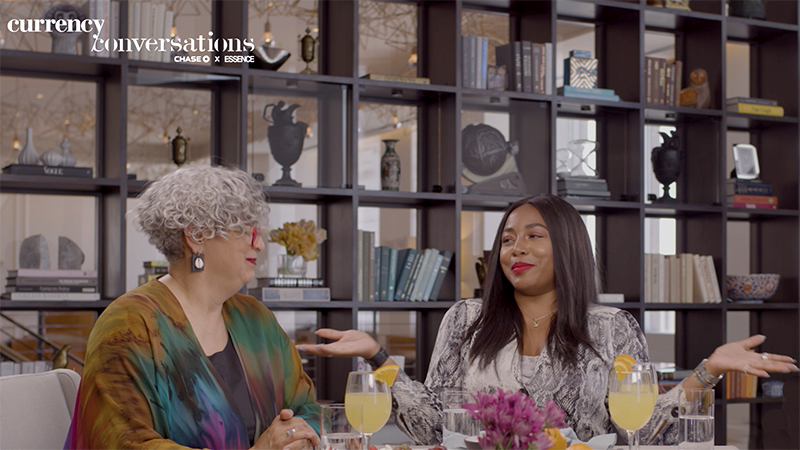Please update your browser.

Stories
Removing the Stigma from the Other “B” Word: Budget
JPMorgan Chase and Essence sat down with two financial experts to discuss financial goals, lessons learned and tips for black women who are ready to save
Budgets—we all have them, but rarely enjoy “doing" them.
And that's just human nature, said Lynnette Khalfani Cox, a personal finance expert, television personality, speaker, and author known as “The Money Coach." We prefer spending our hard-earned money, but it's important to find the happy medium between spending and saving to secure a comfortable financial future.
Cox and Saundra Davis, a financial coach, educator and consultant with San Francisco-based Sage Financial Solutions, sat down with Kela Walker to chat about budgeting and spending as part of Currency Conversations, a campaign with Chase and Essence to encourage black women to speak more openly about their financial goals and how they can achieve them. In this video, they shared lessons from their own financial journeys and tips to help women at all stages of the process.
Q: How do you both approach budgeting?
A: Cox: For me, a budget is not about restricting myself. It's about choosing how I allocate my resources and how I spend my money.
A: Davis: I don't have a hard and fast budget, but I put my money in categories of how I want it to flow. If I say yes to one thing, I'm saying no to something else. If I want to go out to dinner and I'm going to spend more than my allocated amount, I know I have to make an adjustment.
Q: Are there specific tools that can help make the process easier?
A: Davis: You have a budget whether you know it or not. Money comes in, money goes out. I think a lot of times people are afraid of being in the red and getting to the bottom of that budget and discovering there's more month than money. That's why using a tool like the Chase Budget Builder can help you look at what's coming in and what's going out so you can make some decisions about what you want to be doing.
Q: Why is saving so important in the short and long term?
A: Davis: I've been self-employed for 30 years. I would not be okay if I only had one income stream. With multiple streams, I know what's coming in, but I don't always know when it's coming in. When a lot's coming in, I have to hold on to a lot to survive those lean months. Some people call it an emergency fund, but I call it a rainy-day fund because the rain is always coming.
A: Cox: You have to think about what symbolizes that rain and why it's important to think about potentially having multiple streams of income. There could be multiple shocks to your budget. There are a lot of things that can go wrong.
Q: What life lessons stressed the importance of having a budget and saving?
A: Davis: I had to change careers at 40-plus. I was 44 when I went back to school and got a master's degree in financial planning. I learned that I had not saved enough. I had to shift my thinking and realize that I deserved to live well in my old age. I know a lot of women struggling in their elder years because they didn't know to save early. I know I will have to work well into my 70s because of what I didn't do earlier.
A: Cox: Divorce is one of those financial realities that a lot of us are going to go through. I was married for 13 years and it didn't work out. I learned a lot of painful financial lessons. I think we as women need to be honest about that conversation. The idea of not having shame around wherever you are is crucial.
A: Davis: Also, black women, often, are holding it down for a lot of people. Our money is not just our own.
Q: Any other thoughts on the process?
A: Davis: Make sure you're watching it all. I think a lot of times you do a budget, maybe at the start of a new year, and then 2-3 months in nothing is happening. It's not enough to just set it up, you must make sure you're doing what you wanted to do
A: Cox: There's no one strategy or technique that's always going to work for you or for everybody else either. It doesn't matter what you call it—a budget, managing your cash flow or a spending plan of action. If your strategy is working for you, that's great. You're doing just fine.
Learn more about JPMorgan Chase's Advancing Black Pathways initiative, which was created to help black families benefit from economic growth through a focus on education and training, career opportunities, and building lasting wealth through homeownership and entrepreneurship.
